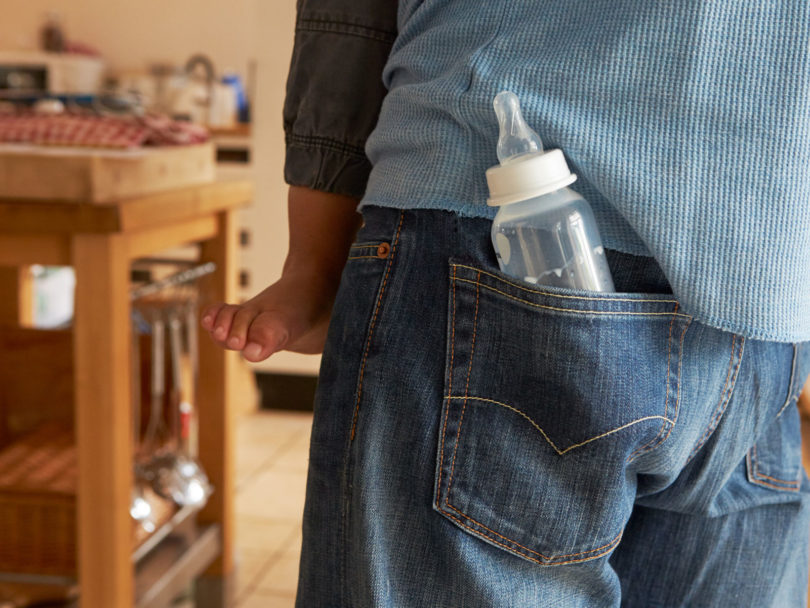They reject the term Mr. Mom and are proud of the line, “It’s not called babysitting; it’s called parenting.” They are stay-at-home dads and, according to the Pew Research Center, their numbers have doubled in the last 10 years to an estimated 2 million strong. They have their own slogans, conferences and even a website, athomedad.org.
Like most of the roles one takes on in life, particularly those labeled as unconventional, there are perks and pitfalls when dad gives up the office for a true family business. Faced with stereotypes and the cultural pressure to “man up,” taking on the role that has historically been the purview of women can be a daunting challenge that goes beyond dirty diapers and endless viewings of “Beauty and the Beast.”

The cultural image associated with a dad running the show at home while mom goes off to work is that of a circus being run by a bungling clown who either turns the reins over to the children or is rescued by a female ringleader obviously more emotionally equipped for the job. Perhaps, not surprisingly, this image is not only agreed upon by many men, it is often used as a ploy to get out of housework and childcare, in the same way many of us get our spouses to look for missing socks.
Just who are these men who see taking care of children not as women’s work but as parenting, and what challenges do they face when work and home become one?
According to the Pew Research Center, in 2014 Virginia had an estimated 48,000 stay-at-home dads—putting the Old Dominion ninth on the national list. According to Pew, 35 percent of stay-at-home dads are there due to illness or disability—the large majority, however, have made the conscious decision to care for the family.
At-home dads face many of the same challenges that moms have traditionally faced, with isolation and lack of appreciation topping the list. According to the National At-Home Dad Network, men experience the extra burden of the stigma of their role being “women’s work” and therefore a threat to masculinity. Taking on cultural biases and, at times, scorn, in addition to the daily stresses of managing a family, can make some dads long for the dog-eat-dog world of office politics.
The potential strain of stepping outside expected gender roles is echoed by Bo Gibson, whose wife, Mary Beth, cofounded Beyond Boobs, a support network that provides encouragement to young women diagnosed with cancer. As a result of Mary Beth’s job duties and travel, Gibson took on the role of stay-at-home dad to help raise their three boys. Gibson admits that “wondering what my buddies were thinking about me” was an issue. He was aware that the perception of a “man making his wife go out and work” could cast him into the “too lazy to work” category.

Like many stay-at-home dads, Gibson emphasizes the fallacy of this notion. He was eager to take on the role, and his wife’s work was both a passion and a common sense decision. As for challenges, Gibson says he didn’t experience that many—at least at first. He laughingly admits that with each new child, the task of scheduling activities and getting everyone where they needed to be on time became more like a juggling act. Like moms around the world, Gibson learned to cherish naptime as his opportunity to catch his breath and “take care of other things around the house.”
Gibson echoes the sentiments of other stay-at-home dads when he counts sharing activities and being able to explore with his sons as prime examples of why he not only misses the role, he would do it again if he could.
Whether men like Gibson represent a new breed of men, comfortable with shifting gender roles and eager to share in the joys and challenges of raising a family, or are a function of the natural evolution in family caregiving, is unclear. What is clear is that, as Al Watts, president of the National At-Home Dad Network, has stated, “…there’s been a great change in society. And there’s a great term for a guy who takes care of his kids. It’s Dad.”
Thankfully, dads who remain at home have two valuable sources of support, encouragement and skill building—they have each other and the timeless resource known as moms. As this new “band of brothers” rallies to carry out the mission of raising a family, they leave in their wake a new definition of manliness and fatherhood. Breaking down barriers that lead to isolation, and overcoming the fear of being seen as unmanly, sows the seeds for the development of a new male mentality. Imagine a future where men seek inclusion over exclusion, value cooperation over competition, and see nurturing not as a gender role, but as a human quality best expressed through the love of their children.


